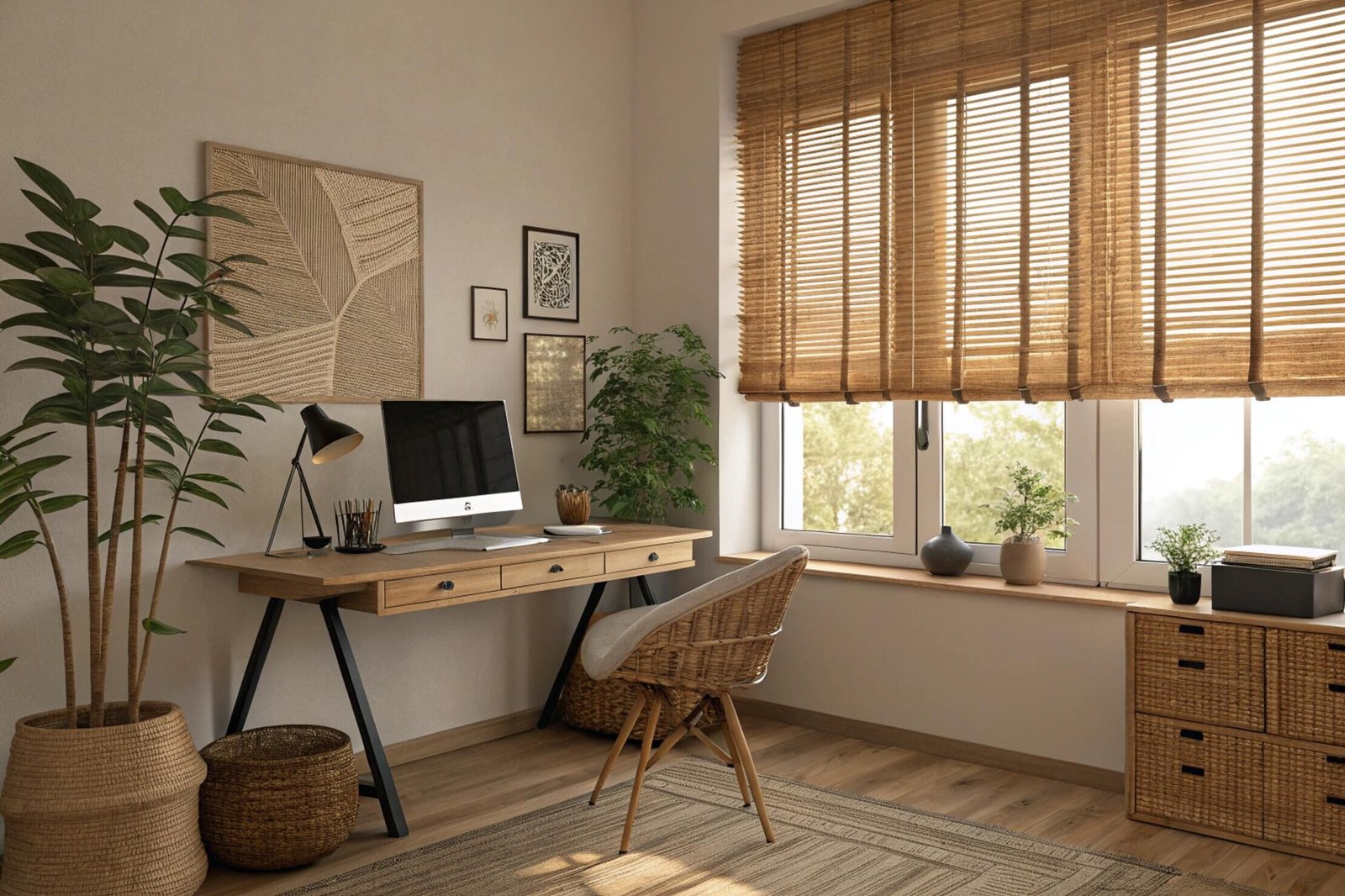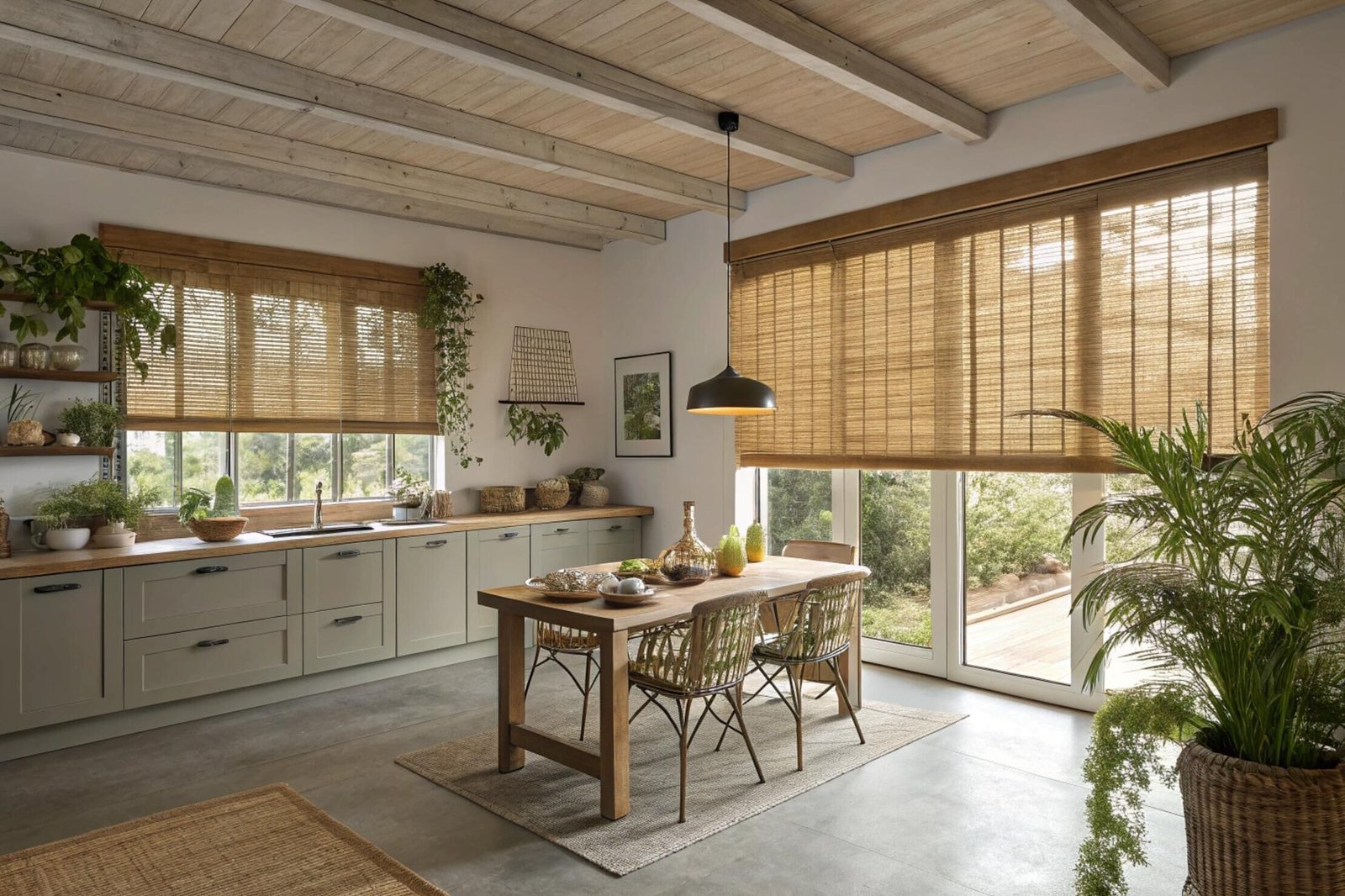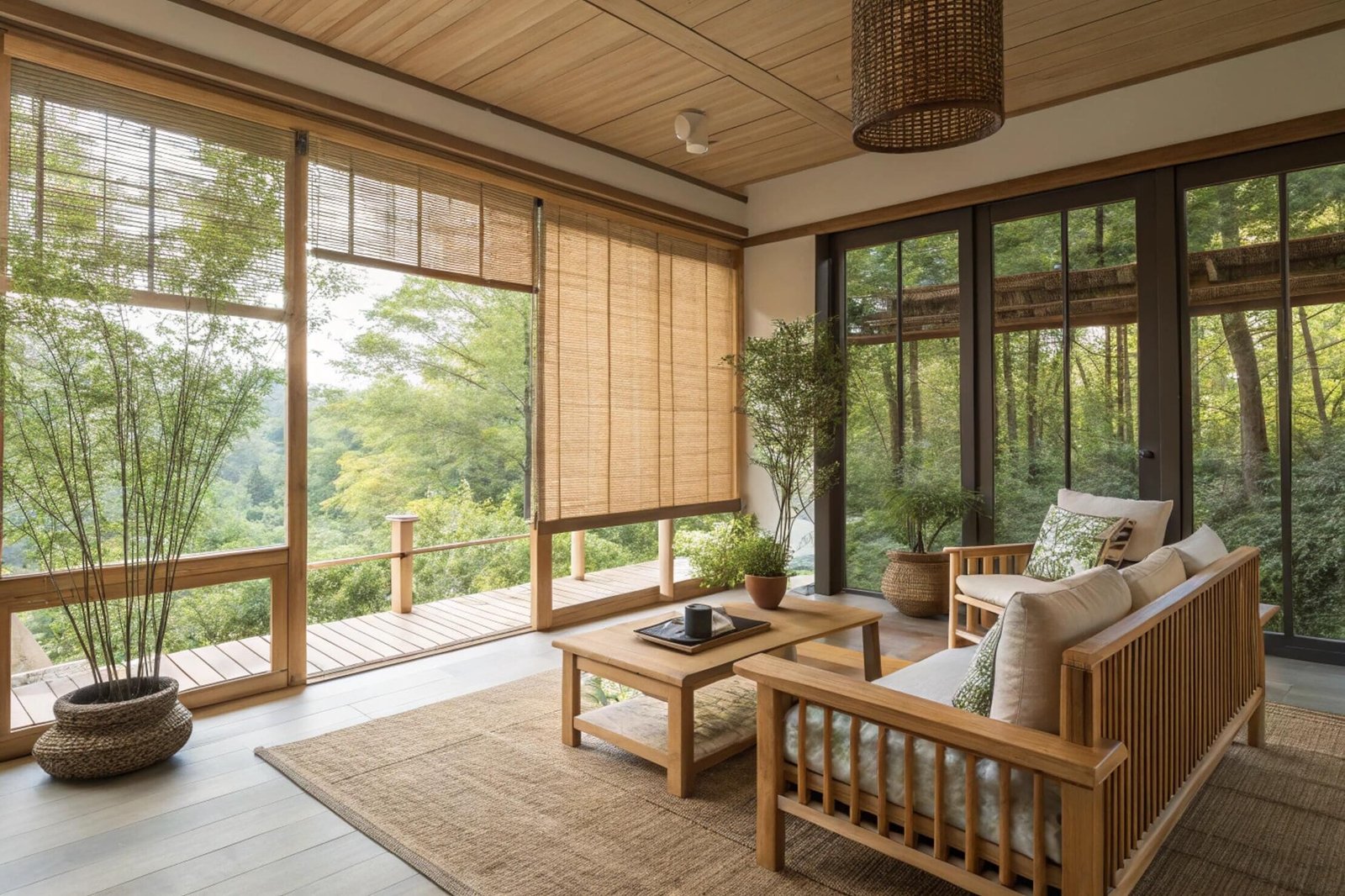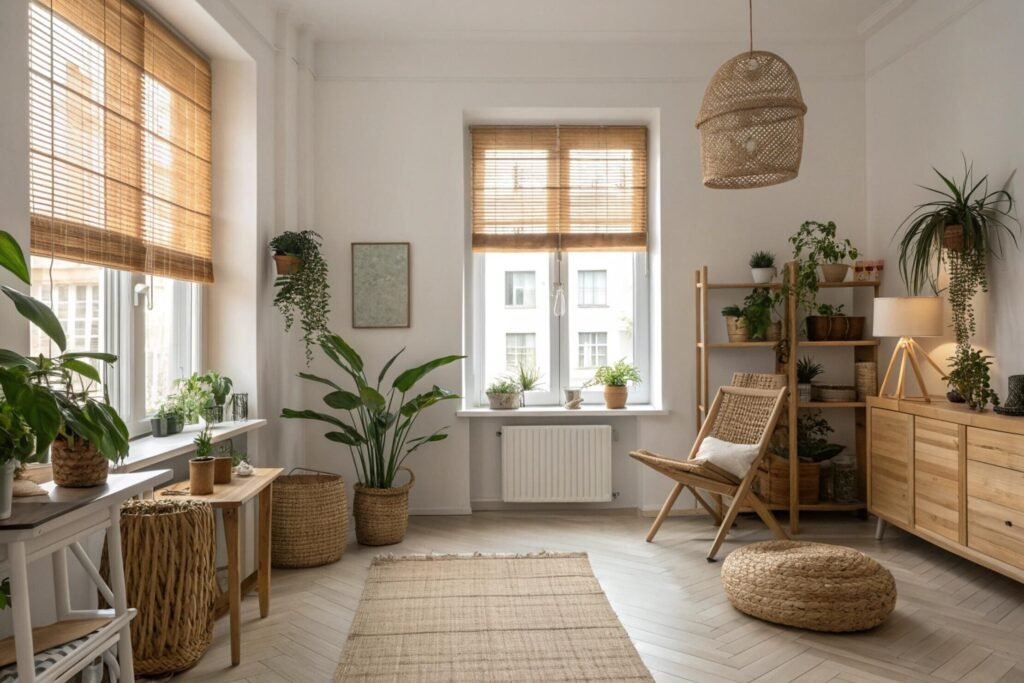Your clients are asking for greener materials, and you need window treatments that align with sustainable design principles1. You're looking for an option that is not only eco-friendly2 but also stylish, durable, and practical for modern projects.
Bamboo blinds3 are an excellent choice for sustainable design because they are made from a fast-growing, highly renewable resource. They offer a beautiful, natural aesthetic that meets the rising demand for eco-conscious interiors while also being durable and effective at providing natural light control4.

I've seen the demand for sustainable materials grow significantly over the past few years, especially for projects aiming for green certifications5 like LEED. Clients want to know the story behind the products they choose. Bamboo blinds stand out because their sustainability isn't just about the material itself; it's also about their performance. By providing effective natural shading, they play a crucial role in reducing a building's reliance on artificial cooling and heating, contributing to overall energy efficiency6.
Are Bamboo Blinds Sustainable?
You're seeing "bamboo" everywhere in eco-friendly product lists, but you're skeptical. You need to know if bamboo blinds are genuinely a sustainable choice or just part of a greenwashing trend.
Yes, bamboo blinds are considered a highly sustainable window treatment option. This is because bamboo is a natural, fast-growing grass that regenerates quickly without needing replanting, requires minimal water, and is fully biodegradable7, making it a truly renewable resource for interior products.

When I talk with interior designers and project contractors, the conversation always turns to material sourcing and lifecycle. Bamboo's sustainability profile is impressive.
Here’s a breakdown of why it’s a top choice:
- Rapid Renewability: Bamboo is technically a grass, not a tree. Some species can grow several feet in a single day and reach full maturity in just 3-5 years, compared to 20-50 years for many hardwoods.
- Self-Regenerating: When bamboo is harvested, its root system remains in the ground and quickly sprouts new shoots. This means it doesn't need to be replanted, which prevents soil erosion.
- Low Input Growth: It requires no pesticides or chemical fertilizers to thrive and uses very little water, making its cultivation much less impactful on the environment compared to other crops like cotton. This aligns with the principles of sustainable living and biophilic design that are becoming so popular.
What Are the Benefits of Bamboo Blinds?
Beyond being sustainable, you need to know if bamboo blinds will perform well and look good in your projects. Will they be durable enough for your clients? Will they fit the right aesthetic?
Bamboo blinds offer a unique combination of natural beauty, durability8, and a low carbon footprint9. They bring a warm, organic texture to any space, are surprisingly strong and long-lasting, and their lightweight nature helps reduce transportation emissions from the factory to your project site.

In my experience, bamboo blinds are one of the most versatile options for designers aiming for a natural or biophilic aesthetic. Their warm tones and woven textures filter sunlight beautifully, creating a soft, inviting glow that artificial materials just can't replicate.
Here's a quick summary of their key benefits for design projects:
| Benefit | Description |
|---|---|
| Natural Aesthetics | The unique patterns and tones add warmth and texture, fitting seamlessly into styles from Nordic Minimalism10 to Sustainable Luxury11. |
| Durability & Longevity | Bamboo is stronger than many hardwoods. It resists warping and cracking from sunlight, making it a practical, long-term investment. |
| Lightweight Nature | Being light makes them easy to install and operate, and it also lowers their carbon footprint during shipping and logistics. |
| Cost-Effective | Because bamboo grows so quickly and is easy to harvest, blinds made from it are often more affordable than traditional hardwood options. |
What Are the Most Sustainable Blinds?
You want to offer your clients the absolute best eco-friendly option. How do bamboo blinds stack up against other "green" choices like wood or blinds made from recycled fabrics12?
While several options exist, bamboo blinds are often considered one of the most sustainable choices due to the rapid renewability of the material. Wood blinds are a good alternative if sourced from certified forests, and blinds made from recycled fabrics are excellent for reducing textile waste.

When evaluating sustainability, I always look at the full lifecycle of the material. Here’s how they compare:
- Bamboo Blinds: The champion of renewability. Its incredible growth speed and self-regenerating13 nature put it ahead of most other natural materials. It’s the top choice for projects where material sourcing is the primary eco-concern.
- Wood Blinds: A beautiful and durable option, but its sustainability depends entirely on its source. To be a responsible choice, you must ensure the wood comes from forests managed by the Forest Stewardship Council (FSC) or a similar certification. This guarantees it was harvested legally and sustainably.
- Recycled Fabric Blinds: A fantastic choice for projects focused on the circular economy. These blinds, often made from recycled PET bottles or other post-consumer textiles, help divert waste from landfills. They are a key component in modern Biophilic Design concepts.
Ultimately, bamboo’s combination of rapid growth, low-impact farming, and biodegradability makes it a leading contender for the most holistically sustainable blind.
What Blinds Are Best for Energy Conservation?
Your projects are increasingly required to meet green building standards, which means energy efficiency is key. How do bamboo blinds contribute to a building's thermal performance?
For pure energy conservation, honeycomb shades14 are the industry leader due to their insulating cellular design. However, bamboo blinds are highly effective at solar shading15, which significantly reduces solar heat gain, lowering the need for air conditioning and contributing to overall energy savings.

This is where my insight about bamboo’s dual role comes in. While a honeycomb shade traps air to insulate, bamboo works by physically blocking the sun's rays.
- Honeycomb Shades: These are specifically engineered for thermal insulation. Their unique cellular pockets trap air, creating a barrier that reduces heat transfer through the window. They are excellent for both hot and cold climates and are often recommended for energy-efficient projects.
- Bamboo Blinds: Bamboo’s strength lies in solar radiation control. The woven material is opaque enough to block a significant amount of direct sunlight. By preventing that heat from entering the room in the first place, bamboo blinds can dramatically lower indoor temperatures during hot months. This reduces the load on HVAC systems, a major factor in a commercial building’s energy consumption.
For projects in warmer climates or with large, sun-facing windows, the shading capability of bamboo is a powerful and sustainable feature.
Conclusion
Bamboo blinds are a leading choice for sustainable design. They merge a beautiful, natural aesthetic with the benefits of a highly renewable resource and provide effective shading to improve a building's energy efficiency. They are a smart, stylish, and responsible choice.
Partner with VelaBlinds for Your Next Project
Smart window treatments shouldn't be complicated. After working with 500+ distributors and contractors worldwide, I've streamlined the process to get you quality products, competitive pricing, and reliable support - every time.
Why project professionals choose VelaBlinds:
- ✅ Fast, Accurate Quotes - Detailed specs and pricing within 24 hours
- ✅ Transparent Pricing - No hidden fees, volume discounts clearly outlined
- ✅ Quality Assurance - Direct partnerships with certified OEM manufacturers
- ✅ Project Support - Dedicated account manager from quote to delivery
Start your next project:
📧 Quick Quote: Send your requirements to info@velablinds.com
📱 Direct Contact: WhatsApp +86 137 2012 8317
🌐 Browse Solutions: https://velablinds.com/
📁 Product Resources: Access spec sheets, catalogs & project files
Paul Chen, Founder
"I built VelaBlinds to solve the real challenges I faced as a project buyer - long lead times, unclear specs, and unreliable suppliers. Let's discuss how we can power your projects with smarter blinds."
Serving distributors and contractors across North America, Europe, and Australia since 2018.
-
Learn about sustainable design principles to enhance your eco-friendly projects. ↩
-
Discover the criteria that define eco-friendly products and materials. ↩
-
Explore the benefits of bamboo blinds as a sustainable option for eco-friendly design. ↩
-
Understand how bamboo blinds effectively manage natural light in spaces. ↩
-
Find out about various green certifications that can enhance your project's sustainability. ↩
-
Learn how bamboo blinds can improve energy efficiency in buildings. ↩
-
Explore the importance of biodegradable materials in sustainable design. ↩
-
Learn about the durability of bamboo blinds and their long-lasting benefits. ↩
-
Discover how bamboo blinds contribute to reducing carbon emissions. ↩
-
Explore the principles of Nordic Minimalism and how it relates to sustainable design. ↩
-
Understand the concept of Sustainable Luxury and its role in modern design. ↩
-
Discover how recycled fabric blinds contribute to sustainability and waste reduction. ↩
-
Find out how bamboo's self-regenerating nature contributes to its sustainability. ↩
-
Learn about honeycomb shades and how they compare to bamboo blinds for energy efficiency. ↩
-
Explore the concept of solar shading and its benefits for energy conservation. ↩




